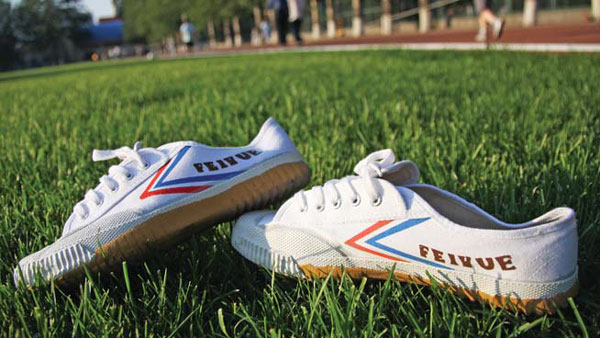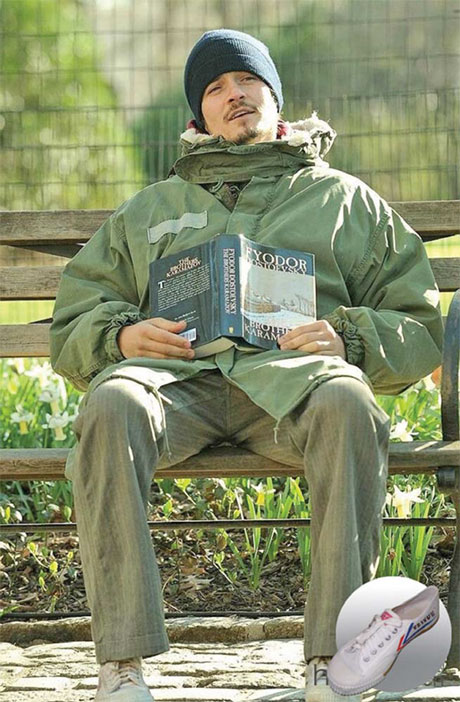Flying forward, once again
Updated: 2016-06-24 08:44
By Wang Ying(China Daily Europe)
|
|||||||||
Chinese sneaker brand Feiyue looks to have shaken off its 'cheap' image by diversifying its product range to attract young consumers
Feiyue is one brand with two distinct realities. While the made-in-China shoes retail for as low as $6 (5.30 euros) on Chinese shopping websites like Taobao, carbon copies made by French company Feiyue Shoes Holding sell for $75 to $150.
Yet the two businesses are in now way affiliated.
|
Same, same but different: China's Feiyue shoes may look just like the French ones worn by Hollywood actor Orlando Bloom, but the two products are priced very differently in the market. Photos Provided to China Daily |

The disparity highlights how the latter has managed to turn the French-registered brand into a fashion essential for trendy people across the world, and how the tables were once ironically turned on China, which has for decades been known for copying instead of innovating.
However, the original Chinese brand is slowly but surely finding its way back onto the feet of consumers after being rebranded as being more than just a cheap, functional shoe for the masses.
Last year's collaboration with The Walt Disney Co to launch a Star Wars-themed series highlighted its ambition to stay relevant to a global audience.
The Chinese brand is available in up to 50 sportswear shops in first and second-tier cities across China. It also it trying to cater to the different demographics by introducing a variety of designs that fall under different price ranges.
Furthermore, China's Feiyue - officially manufactured and distributed by Shanghai Shenglong Shoes Co Ltd - has tapped into the booming e-commerce market to boost its reach. Up to 500,000 pairs are sold through these platforms.
Total sales last year increased by about 10 percent year-on-year, with 2 million pairs sold offline, according to company data.
"We need to offer diversified products if we are to establish a presence in physical stores and online," says Liu Wangsheng, general manager of Shenglong Shoes. "The shoes priced above 200 yuan ($30; 26 euros) have been popular among young people, and we will launch another 28 models in the second half of this year to satisfy market demand."
True origins
Feiyue was founded in 1963 in Shanghai. In Chinese, the name literally means Flying Forward, but Shanghai fashionistas refer to them as "white sneakers".
"The brand was extremely popular among Chinese and was a fashion icon back in the 1980s," says Liu, adding that annual sales of Feiyue sneakers exceeded 4 million pairs during that period.
Back then Feiyue was the footwear of choice, from students to farmers to government officials. Wearing them became associated with dignity and luxury, and there was a widely circulated story about a young man who walked home barefoot in the rain to prevent staining his beloved Feiyue shoes.
After a series of ownership changes and restructuring - the brand is now owned by tire manufacturer Double Coin Holdings Ltd - Feiyue shoes lost their luster and became something only elderly people or martial artists wore, mainly because they are cheap and durable.
In the late 1990s, Feiyue's manufacturer put the brand up for sale, and when international brands such as Adidas, Nike and Converse started to become popular at the turn of the century, Shanghai Shenglong Shoes Co Ltd decided to kick-start a revival by relaunching production in 2003. It went on to set up a design department in 2005.
In 2006, Patrice Bastian registered the Feiyue brand name in his native France after chancing upon the shoes during a kung fu class in Shanghai. Together with a group of designers, he refashioned the humble sneakers and attempted to globalize Feiyue through a series of collaborations and marketing campaigns.
Two years later, a photo of Hollywood actor Orlando Bloom wearing Feiyue shoes on the set of the film New York, I Love You gave the French brand a massive boost.
Before long, Feiyue had cult status among the world's trendy. French luxury fashion house Celine partnered with Feiyue to produce a limited edition high-top sneaker, while similar collaborations were undertaken with Singapore's famous nightclub Zouk.
In 2011, Global Times quoted a manager from Shanghai Shenglong Shoes as saying the company would sue the French entity for intellectual property rights infringements if it entered the Chinese market.
Unsurprisingly, the French brand has kept a low profile in China.
"The French company (Feiyue Shoes Holding) was bought in 2014 by a US company, BBC International, which is the licensee for the footwear of numerous American brands. BBC wants to develop a fully owned brand and has decided to grow Feiyue in the international market," notes Michel Gutsatz, adjunct professor of marketing at the China Europe International Business School.
Ning Zhong, a professor at Fudan University's School of Management in Shanghai, says the success of the French Feiyue sneakers has taught Chinese brands a lesson on how a brand can boost its value through successful marketing.
For example, the French had focused largely on the heritage of the shoes and its vintage look to capture the attention of consumers. It told the world how the brand could be traced back to the 1920s and how it was closely tied to Shaolin monks, who would wear the shoes for martial arts training.
"The rise of Feiyue outside of China has much to do with the European fashion world's fascination with retro or traditional China. To them, Feiyue is not merely a pair of sneakers, but nostalgia," Ning says.
He adds that part of the French brand's success could be down to the fact people outside China tend to own more shoes. Each Chinese person owns on average 1.7 pairs of shoes, less than half the average in the West.
Another Chinese shoe company that used the element of nostalgia to much success is Warrior. Started in 1927 in Shanghai, Warrior was like Feiyue in many aspects, including being the footwear of choice for many of the country's top athletes in the 1970s and '80s.
Unfortunately, the brand faced a similar decline. Gui Chenggang, Warrior's executive director, says the company was inspired by the French Feiyue's phenomenal development in foreign markets and as a result developed new products in 2008 and focused on the element of nostalgia to engage the young generations in China.
The campaign was a huge success and Warrior's annual revenue tripled from about 200 million yuan in 2010 to more than 600 million yuan in 2013. Warrior's revenue for last year was projected to hit 750 million yuan.
"Looking at the narratives of Shanghai's famous brands, we found that the market has always welcomed those that have constantly strived to stay unique and be creative," says Jiang Weihong, a researcher with the Shanghai Academy of Social Sciences.
Required rectifications
Ning says despite the massive volume of made-in-China products, many companies are unable to break into the international markets because they are strictly original equipment manufacturers. Chinese enterprises will need to hasten their transformation into companies that can add value to their products, he says.
"The stories of big European brands teach us that it is important to consistently develop a brand and have a leader with an international vision. These are vital factors in ensuring that a brand stays competitive over time," Jiang adds.
Today, one of the main problems Feiyue faces in China is the proliferation of knock-off sneakers across all sales channels. Liu says at least 1 million Feiyue sneakers are sold in villages and small towns, but only about 10 percent are made by Shanghai Shenglong Shoes.
He adds that the company has attempted to convince consumers that Shanghai Shenglong Shoes is the only authentic source of Feiyue sneakers, but copycats have countered with their own claims.
"In the past two decades, we've paid a lot of attention to the results and success without giving much focus to honest, fair competition and intellectual property rights. It's time to start addressing these issues now, and it's going to require the efforts of the government and enterprises to effect change," says Wang Jun, a professor in trademark law at Fudan University.
wangying@chinadaily.com.cn
(China Daily European Weekly 06/24/2016 page28)
Today's Top News
German Viernheim cinema attacker shot dead
UK print media bombards readers on referendum day
Fact box about Britain's EU referendum
What they say about Brexit
Putin confident in Russia-China all-round cooperation
Turkey may vote on negotiations with EU
Britons edging closer to voting to remain in EU
UK to opt to stay in EU: Portuguese president
Hot Topics
Lunar probe , China growth forecasts, Emission rules get tougher, China seen through 'colored lens', International board,
Editor's Picks

|

|

|

|

|

|








